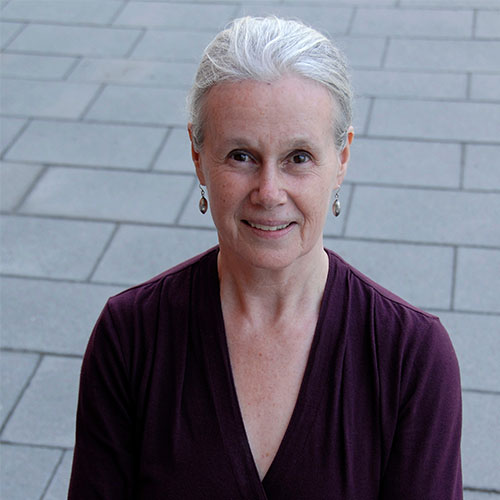Visiting Poets
Annie Boutelle
With astonishing ease, Annie Boutelle’s poems manage to be elegant, fierce, gorgeous, and spare—all at once. Her two books of poems, both published in 2005, quietly offer entry into other lives, other languages, and their quietness belies the depth of feeling that rises up as we look at the world through her clear-eyed gaze.
Becoming Bone (Arkansas University Press) seeks to recover the inner life of Celia Thaxter, one of nineteenth-century America’s most popular poets. “Like whaler’s scrimshaw, images incised on shell and bone, Boutelle’s lines seem etched, indelible,” writes Eleanor Wilner. “In a language as spare, exact, and essential as necessity itself , [she] tears aside the flowery veils of feminine concealment of another age, to give voice to the inner life of an islanded soul.” Gerald Stern, former Poet Laureate of New Jersey, has dubbed the book “a magnificent secret history.”
In Nest of Thistles, winner of the 2005 Samuel French Morse Poetry Prize, and in part an autobiographical exploration of her childhood in Scotland, Boutelle applies a similarly fierce intensity to the recovery of her own life and language. With patient care, she maps the borders of unrecoverable loss and unbounded joy. Nuala Ní Dhomhnaill admired the book’s “powerful resonance, a quivering presence like a Highland landscape seen through a summer heat haze.” Writes Henri Cole, “Annie Boutelle’s poems are muscular and clean. She writes with her ear. And though death often clings to the edges of them, it unexpectedly breathes life into the surface of things. If you listen, you can hear a heart’s quiet roar.”
Born and raised in Scotland, Boutelle was educated at the University of St. Andrews and New York University. She is the author of Thistle And Rose: A Study Of Hugh Macdiarmid’s Poetry and numerous essays on scholarly and popular topics, and her poems have appeared widely in journals, including the Georgia Review, Green Mountains Review, the Hudson Review, Nimrod, and Poetry. Boutelle, who lives with her husband in western Massachusetts, is the founder and guiding light of the Poetry Center.
A member of the English Department since 1984, she heeded Ruth Simmons’s 1996 call to “dream big dreams,” envisioning a program to bring an ongoing stream of distinguished poets to Smith. Faculty, students, and alumnae responded enthusiastically, and thus the Poetry Center was born. As chair of the Poetry Center Committee, Annie continues to guide the center’s efforts to secure full and stable funding and to develop an outreach program.
Select Poems
The schooner slips from Portsmouth and the river
widens, a snake that opens sluggish jaws
to swallow the sea, and everything slides
past – bricks, the pared spire of the church,
wharves, chimneys, terraced plots of green,
that thin woman who bends to her basket and pegs
scraps of clothing on a line, that clump of elms,
a hearse meandering on its way, the boy
with the brown cap fishing from a pier, the silver
body of his catch twitching an arc that swings
from him as everything moves past without word
or protest and the ship glides unperturbed
into a world where nothing is left but water,
air, and the uncertain space between.
from BECOMING BONE (University of Arkansas Press, 2005)
I see them in dreams, Ben More, Stobinian, Nevis, Schiehallion.
Bald and stern, no touch to soften or gentle, granite heaved
up and weathered down to what remains. Nothing more
Scottish that these – their inflexibility, their indifference.
They condemn pretension, and kill fools. Sleeping
monsters, these whales of hills have traveled
far and plan to go no farther. Cliffs, screes, ridges, flints,
ramparts, boulders, gullies. Such flanks, such haunches,
such wide breasts with nipples of cairns that point to heaven
as if a godlike child might reach down his lips and suck. Wind
wraps them in lamentation. Sun polishes their stubbornness.
Moon’s silver calls to the silver of their calm. Rain lashes
and lashes them and they do not deign to notice. And children,
looking up, see another kind of parent, one that endures.
from NEST OF THISTLES (University Press of New England, 2005)
Some battered leaves, a simple woven basket
that overflows with figs, red and black grapes,
an apple, peach, two pears. And everywhere
that longing to survive, to thrive, as the thin
and desperate stem rises to the right and lifts
off beyond the frame Praise the luscious, touch
your hand to apple’s worm hole. Everything
earnest, grapes jostling. Nothing on its own,
yet each one lonely. All that space and air
in a gold background that haloes the lost,
the soon-to-be-not. Water drops spill like tears
down the leaves, and what is dream, what is waking?
from THIS CARAVAGGIO (Hedgerow Books, 2012)
Also available as a Broadside
Poetry Center Reading
Fall 2004Fall 2005
Fall 2012
Fall 2014

